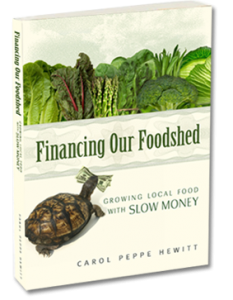
As people become disenchanted with the lending system in America, they have begun to invest their money locally in projects where they can realize the value of their investment in the goods and services they use. Additionally, it helps them ensure that their money is going toward projects that support their value system.
The concept is a very old one dating back in time to when local barons used their wealth to fund businesses in their communities. Carol Peppe Hewitt, founder of Slow Money North Carolina and author of Financing Our Foodshed: Growing Local Food with Slow Money, has served as a catalyst to encourage the use of slow money to fund local entrepreneurs in their quests to become self-sufficient and serve the needs of their local communities. Using peer-to-peer low-interest loans, community members can use smaller amounts of money from their savings accounts to fund community producers, processors and distributors who make their local food system a viable reality.
Since founding Slow Money NC in 2010, Carol has brokered over 125 peer-to-peer, low-interest loans to 63 small farmers and local food businesses in North Carolina. In 2011 Carol found 16 like-minded people and together they formed a Limited Liability Corporation to refinance her local co-op grocery store, a $400,000 loan. The local loan saved the co-op from balloon payments and brought the savings home to where the local community could benefit by keeping the money circulating locally. Next, the group purchased a 75-acre farm site that has become the home of the Shakori Hills Cultural Arts Center, providing music and other cultural events for the local community.
At a recent Food Summit in Moscow, Idaho, Carol presented a blueprint any community can use to support locavore entrepreneurs. “How many here have at least $1,000, just sitting somewhere, that isn’t being used?” she asked. The quick show of hands indicated that there was a vast pool of resources not being used by the local community. By working together, small amounts can have a significant impact on individuals by financing a startup or helping a small farmer buy essential equipment, seed or livestock.
Carol’s focus is simple. Slowing money down and keeping it local promotes local community prosperity. Beyond the financial gain, the largest dividend may in fact be the satisfaction that lenders experience by becoming more involved in their communities. As the Moscow Food Summit concluded, talks of investment clubs and peer-to-peer “fund-your-farmer” loans began to buzz throughout the community.
Two local entrepreneurs are already leading the way in “fund-your-farmer” loans. George Skandalos and Carly Lilly, owners of Sangria Grille (one of Idaho’s top 10 restaurants) and Maialina’s Pizzaria, are strong locavore advocates who source as much of their product as possible from local producers who are using regenerative agriculture techniques. Last year they helped fund some of the farmers who provide high quality locavore products to their restaurants. Their local purveyor’s board proudly displays the farm names and products used in the restaurant. One farm in particular, Sosoni Institute & Farm, is a bit different. The farm is a demonstration site for regenerative agriculture with the Sosoni Institute, a Savory Hub focused on improving grasslands through holistic management principles. The Sosoni Institute serves as an education resource as well as a young farmer incubator, both being of key importance to locavore entrepreneurs George Skandalos and Carly Lilly.
A successful business owner herself, Carly Lilly understands the challenge of raising capital to start-up, run or expand a small business. Growing up in rural Moscow, Idaho, she watched as small farms disappeared in her community. Now she’s working to change that trend, encouraging local farmers to produce products that she can feature in her restaurant.
It isn’t an easy change to make, however. Small farmers often need capital to invest in infrastructure and product so that they can provide the products Carly needs for the restaurants. Using the tools of peer-to-peer lending, investment clubs and crowd-funding can provide the critical link that is needed for the success of the farmer, the restaurant and the locavore food community.
Entrepreneurs like Carol Peppe Hewitt, George Skandalos and Carly Lilly represent a bright future for the locavore movement as they provide the much-needed inspiration and avenue for local farmers to grow. Organizations like Sosoni Institute help complete the circle by teaching farmers how to manage holistically towards an economically sustainable future that is environmentally and culturally sound.
Moscow, Idaho is just one example of the locavore food movement. There are many more examples across the country of individuals taking the lead to support their local foodshed. Take a look around your community…is there something that you can do to support your local farmer?
Pam Holloway is a member of the Farm-to-Consumer Legal Defense Fund.
YOUR FUND AT WORK
 Services provided by the Farm-to-Consumer Legal Defense Fund (FTCLDF) go beyond providing legal representation for members in court cases.
Services provided by the Farm-to-Consumer Legal Defense Fund (FTCLDF) go beyond providing legal representation for members in court cases.
Educational and Political Action Services also provide an avenue for FTCLDF to build grassroots activism to create the most favorable regulatory climate possible. In addition to advising on bill language, FTCLDF supports favorable legislation via action alerts, social media outreach, and the online petition service.
You can help FTCLDF by becoming a member or donating today.

 Anyone wanting to make a contribution to support the work of the Fund can make a donation online or send a check to:
Anyone wanting to make a contribution to support the work of the Fund can make a donation online or send a check to:
FTCLDF
8116 Arlington Blvd, # 263
Falls Church, VA 22042
Prefer to make a tax-deductible donation? Contact us by email at [email protected] or call 703-208-FARM (3276).